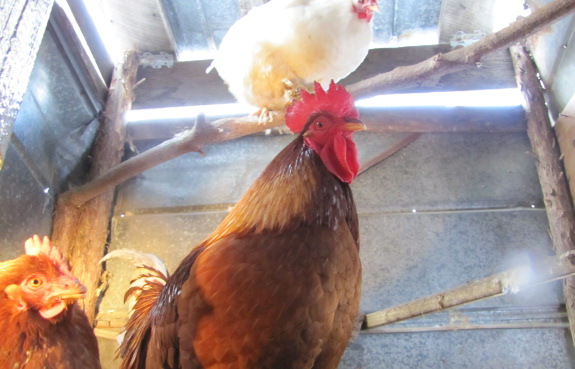
What the flock might be thinking

I sometimes wonder if our flock
ever feels cooped up on a day like today?

Want more in-depth information? Browse through our books.
Or explore more posts by date or by subject.
About us: Anna Hess and Mark Hamilton spent over a decade living self-sufficiently in the mountains of Virginia before moving north to start over from scratch in the foothills of Ohio. They've experimented with permaculture, no-till gardening, trailersteading, home-based microbusinesses and much more, writing about their adventures in both blogs and books.
Want to be notified when new comments are posted on this page? Click on the RSS button after you add a comment to subscribe to the comment feed, or simply check the box beside "email replies to me" while writing your comment.

Has your egg production increased/decreased/remained the same in your coop as compared to your chicken tractors in winter? How about winter feed consumption?
Those are great questions, Erich! I wish I had better data for you, but the thing is that we have a very different set of layers than last year since we took our three barely-laying Barred Rocks, a problematic young Golden Comet, and a sick old Golden Comet out of the picture this fall. My best guess based on last year's data is that we're getting the same number of eggs per day per bird (or maybe very slightly more? It's hard to decide now to factor those two Golden Comets out of last year's averages), which is actually pretty good since I suspect our oldest Golden Comets have passed beyond their prime winter laying, even more so than they had last year. I figure that getting the same number of eggs per bird when everyone is a year older is a step up!
In terms of feed consumption, I'm feeding just a hair less than this time last year. Everything's under snow and has been for about six weeks with just a few thaws, so there's really nothing for the chickens to eat other than what I give them. That said, I'm able to focus them more on the food scraps we have (like the few butternuts I let freeze, etc.), which wouldn't have worked so well in the moving tractor environment. (I've found that in a tractor, chickens eat any food scraps which are immediately enticing, but don't come back to the less enticing ones the way they do if they're in a stationary situation.) I hope that'll change when I call the principal of the local school this Friday and beg for cafeteria scraps!